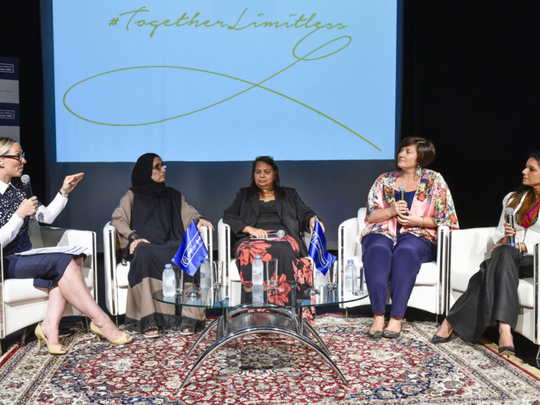
DUBAI The UAE’s special needs community has received a big push with a leading bank launching a series of ambitious initiatives for their betterment.
From enhanced privilege cards to job inclusions, the initiatives seek to empower those with disabilities by helping to harness their full potential.
Themed “Together Limitless’, the measures were announced by Husam Al Sayed, Emirates NBD’s general manager, group human resources, in Dubai on Tuesday.
To begin with, the initiatives cover enhanced benefits for Sanad Card holders. The Sanad Card, developed by the Community Development Authority, is the first smart card in the UAE that enables people with disabilities, both Emiratis and expatriates, to obtain different benefits, privileges and discounts at private and public entities.
Job opportunities
Al Sayed said the bank will also work to ensure greater workplace inclusion for the disabled by recognising talent, hiring and training them. Towards this end, the bank has entered into a long-term partnership with the special needs centre Manzil’s PRIDE (People Receiving Independence and Dignity through Empowerment) programme.
He said the bank is working at providing better access for the disabled to its branches across the UAE. “We want to collaborate with the public and private sectors to build momentum in our campaign to create a more inclusive environment,” he said.
The bank also convened a panel discussion among special needs educators and parents to understand the challenges faced in the education of special needs children.
Stephanie Hamilton, mother of a Downs Syndrome child, said she had to grapple with 40 rejections before a mainstream school in Dubai could admit her daughter.
Dr Ayesha Saeed Husaini, founder director of Manzil, said the cost of providing education to a special needs student is twice as much as that of a regular child as it entails specialised skill sets in teaching, smaller teacher to student ratios and other specific requirements.
Dr Isphana Al Khatib, director of the Al Noor Training Centre for Children with Special Needs, said: “The cost of educating a child at our centre is Dh70,000 a year. Special needs education is more expensive because we are not here to teach just academic skills, but also life skills. Getting the right therapists is not easy as we live in a transient society.”
Dr Muna M. Alhammadi, social care specialist at the Community Development Authority, shared the challenges she faced as a visually impaired person while pursuing her studies. “I would like to see a society that reasonably accommodates people with disabilities,” she said.













